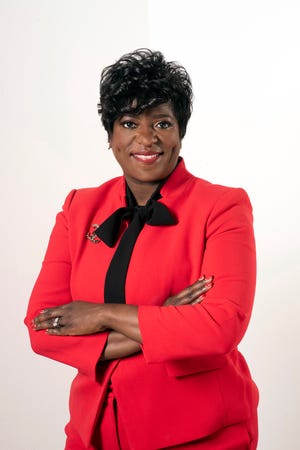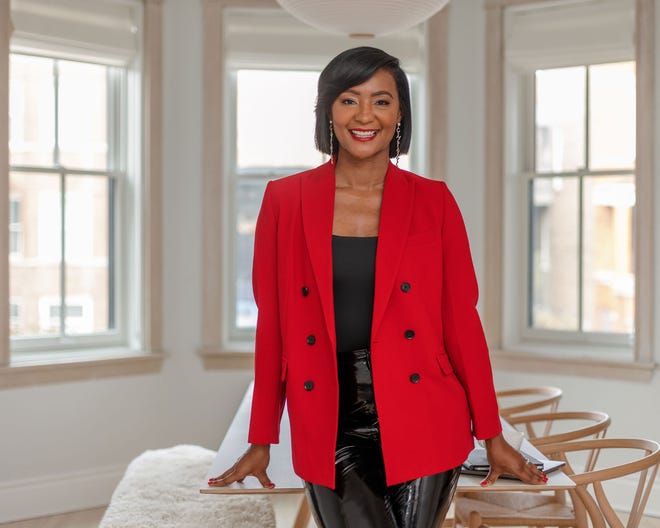4 Black Women From Detroit Sitting in C-Suite Positions Look to Add Diverse Voices
April 20, 2022Jasmine Barmore
March 31, 2022
When Tanisha Sanders left her executive-level job at the beginning of the year, she said it was important that she left the door open for someone who looks like her.
The Detroit native was a C-suite executive at a Fortune 500 company and the only Black woman serving at this level, at that time. Sanders left the organization after a little under five years and joined ITG Brands, the third-largest tobacco company in the country, after they offered her an opportunity to be the Senior Vice President of Corporate and Legislative Affairs for the Washington D.C. office.
“When I left my previous company, I made sure that they had a good list of qualified and diverse candidates” the 41-year-old seasoned corporate affairs professional said. “At the same time, I was very intentional about ensuring that the list included someone who looked like me.”
Despite advances for women, people of color and LGBTQ people in the workforce over the years, women of color sitting in C-suites for Fortune 500 companies and top organizations still are a rarity across the country. Unchanged data and statistical overviews since 2018, according to a Korn Ferry analysis, say that women alone only represent 25% of the C-suite positions, the executive leadership roles at a company that report directly to a business’ president and/or chief executive officer. And women of color make up only 4% of these seats.
And while many corporations have now instituted a Diversity, Equity and Inclusion office, there still is much work to be done to include Black female representation at the executive level. The Detroit Free Press spoke with Sanders and three other women from Detroit who sit in C-suites for top organizations and Fortune 500 companies about how to bring more Black women into these seats. They all agreed on one thing: “create space.”
“I feel like once you get your space, it’s important for you to create a space for others,” said Byna Elliott, an executive for JPMorgan Chase.

Elliott, 52, is the global head of Advancing Black Pathways for Chase Bank. And the position’s title alone could not be more fitting for her.
Before she stepped into the role, she was a senior vice president for Fifth Third Bank. When she got into that position, she was the only Black woman, she said. But when she left the company, things were different.
“When I walked in the room, I was the only Black woman that had been promoted to the C-suite level at the time. When I left the organization to go to JPMorgan Chase, there were seven of us in the room.
“And I feel like I had a role in that.”
‘We need our own table’
For Elliott, one way to create space for more Black women in the C-suites means building “our own table.” But she, along with other C-suite execs, say that’s not all.
Creating an inclusive table where Black women can have a seat takes much more than just the Black woman, said Denise Brooks-Williams, a senior vice president for Henry Ford Health System and the Chief Executive Officer of its North Market. A company’s leadership has to be very “intentional” in creating space as well, she said.
“We have to have candidate slates that represent the opportunity that we claim, or we are, in truth, trying to fill. If you want more women, you have to interview some women.”
When Brooks-Williams, 54, first came to Henry Ford in 2013 as the president and CEO of Henry Ford Wyandotte, it was one of the first times she entered the C-suites where someone in the room looked like her, at least somewhat: There were Black people in the C-suite, just not a lot of Black women, she said. But it still was a giant leap from the early days of her C-suite career, where, at times, she was the only person of color and/or woman in the room.
“I would say, in my Henry Ford days, it’s rarer to be the only person (of color) in the room because we are an incredibly diverse organization” said the Cass Tech alumni who holds a bachelor’s and a master’s degree from the University of Michigan,. “But when I was (the only person of color in the room); whenever I felt discomfort or felt like my voice wasn’t being heard, my struggle would always be, ‘Is it because I’m Black?’ ”
The “Is it because I’m Black” concern is a common question that many Black people self-consciously ask themselves — especially when they don’t feel they are being heard. It can, in fact, be considered parallel to the Angry Black Woman or Angry White Male stigma, experts say.
In spite of the stigmas, 40-year-old Teedra Bernard, the senior vice president and Chief Talent and Diversity Officer for TransUnion, says Black women need to shift their mindset from not feeling they belong to “knowing we belong in these rooms.”
Confidence
Bernard said it was a game-changer when she was appointed two years ago to serve as TransUnion’s first ever SVP and Chief Talent and Diversity Officer. After working for years in human resource management, the Detroit-bred executive said she always wanted to create opportunities and open doors for other people who looked like her.

“Honestly, one of the reasons I decided on HR is because I want to be in in the room. I want to be a part of the conversations. … And I want somebody that looks like me to be a part of those decisions.”
Things didn’t start this way for Bernard though, and she said she didn’t always have the confidence she has today to be a part of the decision-making conversation. Reflecting on a time during her undergrad years when she was studying engineering — her first love — and attended a career fair, she said, her thinking began to change. At that career fair, she was speaking with the representative of a company she wanted to work for — but that she did not want to name — who told her that she would be hired for an engineering role, but not because of her talents, but because of “affirmative action.”
“That was debilitating” she said.
Bernard went on to graduate from Michigan State University with a bachelor’s degree in business. She then earned a master’s degree in human resources from New York University, and things took off from there.
“I moved up in my career within about 10 years,” the Chief Talent and Diversity Officer said. “And no, I didn’t have it all together. But what I finally realized was that I was meant to be in the room and I do deserve to be here.”
To be confident in the room, Sanders said, it means creating a space where everyone can be their authentic self.
“I think the culture of a company is driven from the top down,” she said.
For ITG Brands, Sanders is currently the second Black woman serving as a member of the C-suites. Her boss and the company’s CEO, Kim Reed, also is a Black woman.
“I can show up every day and be my authentic self,” Sanders said.
Creating space
“We stand on the shoulders of giants,” Sanders said of herself and other Black female C-suite executives. The wife and mom, graduated from Michigan State with a bachelor’s in political science. She earned a master’s degree in public administration from Western Michigan University.
Everyone, she said, has had some sort of support.
“There is always someone to look back at and say this person mentored me or sponsored me,” she said.
Meaning, someone create a space for her.
A mentor is someone who talks to you, she said. A sponsor is someone who talks about you — in a good way; someone who leverages their network and relationships, and when they’re sitting in rooms you may not be in, they will use their “sphere of influence” for you.
Elliott said she is a huge advocate for sponsorship. The Cass Tech graduate credits such relationships, along with her own ability to deliver, as key factors in how she got to serve in such an influential role as a C-suite leader. And because of that, the Eastern Michigan University alum says she leans in on times of opportunity to sponsor others.
“There’s so much power when there’s other women and other people in the room that are diverse,” she said. “When you have that second voice in the room that says I support your idea, it really strengthens the ability to move and change an organization and create a more inclusive environment.”
Bernard said there is a uniqueness in her role as the DEI officer at TransUnion. One aspect of it is being able to be a part of how the company attracts people to the organization, but also how it is able to retain and develop them. And she also gets to make sure the “D and I” (Diversity and Inclusion) is being infused into the company’s culture.
It’s a benefit for her when she mentors or sponsors someone, she said, because she can apply the lessons she has learned to make sure her mentees or people she sponsors have the qualities and qualifications to be a good fit for the role and the organization they are pursuing.
Brooks-Williams said there are still a lot of initiatives and strategies around making sure there is continued success and elevation of Black people, especially women, to the C-suite.
But in order to keep creating space for new faces, she said you have to think, “after we get the seat, how do we keep the seat?”
Sanders says there is only one way.
“When an opportunity presents itself, take it.”
And deliver.
